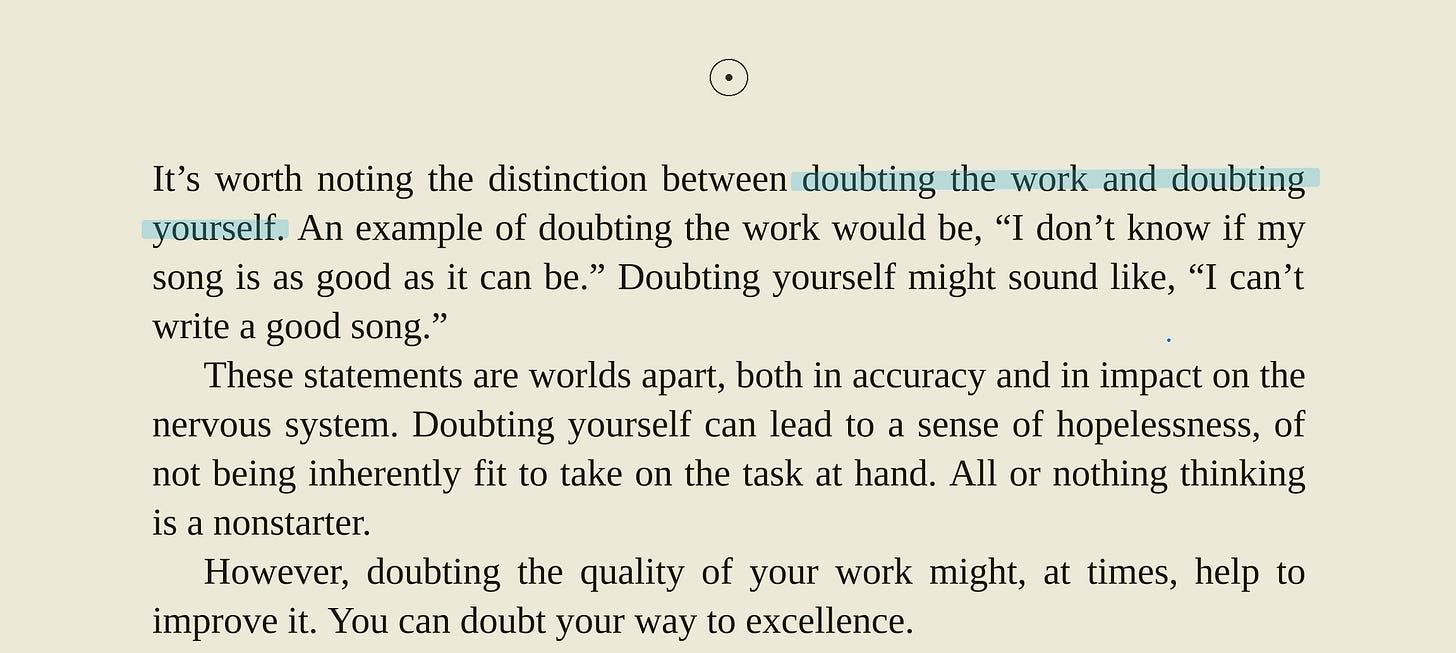Reading The Creative Act as a design student
Mild spoilers, aka I actually tell you what to expect.
I really love the core premise of this book, which is about how creativity is a way of life, rather than a tool you use at work. It (like many things to come in this book) can sound a bit obvious once you read it, but we often don't even live by the simple things.
Beyond the clichè
This book is a collection of advice for living in that “creative” way, and it was always inevitable that he would mention lots of clichè advice we've already heard.
I have to say though, I was pleasantly surprised with how he handled it.
As expected, there was absolutely endless already-heard advice, but he went deeper. He explored what it would look like to actually do those things, and acknowledged some of the fallacies! Here's an example, where he talks about believing in yourself— the OG clichè advice.
I've had trouble with that advice because it implies that my worry over my work is baseless, and I should simply stop worrying. Big shocker- if you're making creative things, challenging your own work is important (and inevitable). The way he put it makes a lot of sense— and allows you to be properly critical about what you make without impacting your self-confidence.
A lot of advice in this book is similarly realistic, while retaining the philosophical, thoughtful train of thought. Speaking of…
Philosophy?
This book was described to me as a philosophical exploration of creativity. And it sure is.
That style can be hard to read if like me, you consider yourself to be a logical and practical person. For example, he tells a story of an old man in Kolkata (he writes Calcutta, but I will respect the city's name) who carries a clay pot and lowers it into a well to fill water. He slowly and painstakingly repeats this process, making sure the pot doesn't hit the side and break. When a traveller suggests a pulley system that could do this task with less effort, the man says that he performs this process with a lot of care— and without that, the water might not taste as good.
(Aside from the fact that even small villages have pulleys in wells) This story is frustrating to read, because the man does something seemingly stupid by saying no to helpful innovation? And we’re supposed to be on his side here?
It is a skill to look past all that and take his point, which is to enjoy and love the process of creativity, because the result won’t be as good without it. You’re not a bad reader for not immediately having this skill, but developing it is well worth it.
A vessel.
In the end,
the sum total of the essence
of our individual works
may serve as a reflection.The closer we get
to the the true essence of each work,
the sooner they will somehow,
provide clues as to our own.
Another powerful current running through the book is the idea of surrendering to the work itself, rather than letting ego or the desire for external validation dictate the process. Rubin often speaks of the artist as a conduit, a vessel through which ideas flow. He suggests that sometimes, flaws make art more emotionally resonant. The true value lies in the act of creation and the connection it fosters, not in an unattainable ideal of flawlessness.
4 stars ⭐️⭐️⭐️⭐️
Most of this book is written in a continuous format with no narrative- you could flip to any page of this book, and come away with a random but thoughtful piece of creative advice. And that advice truly spans through so many aspects of creative work I couldn’t possibly go through them all. This is an excellent book to read if you're feeling creatively frustrated and can't pinpoint why.
This book is basically putting a lot of different creative thought-processes to words. Most of them will sound normal- but it's the ones that strike you, the ones that put words to a feeling you've had but couldn't express, that truly make this book shine.
📖 What I’ve been up to
I tried to get back into journalling, very slowly. I stopped a few months ago because it was starting to feel like a chore, but I’m back on the wagon now because I miss writing out my feelings.
If you also feel like journalling can be “too much”, then I have some advice for you. This will sound simple, but journal only when it’s needed! No daily-s, or weekly-s, just write when you think you have something to work through. A big event, or a big emotion.
⏭️ Up next
‘s second guest article! Peak internet-y topic this time, about how memes have become our source of news.
— All the best, Apurva.



